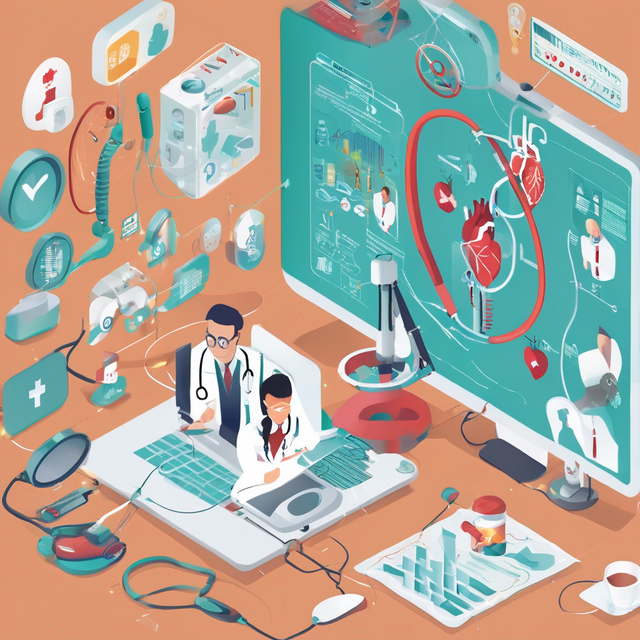Unlock the Benefits of AI in Medicine Today! Explore Its Impact and Discover What's Possible

Artificial intelligence in medicine
AI, or artificial intelligence, has made significant advancements in the field of medicine and its benefits are waiting to be unlocked today. Its impact on healthcare has been immense, revolutionizing the way we diagnose, treat, and prevent diseases. By exploring AI's potential, we can discover what is truly possible in the world of medicine. From improving patient outcomes to streamlining processes, the possibilities are endless. Don't wait any longer to tap into the power of AI in medicine and reap its rewards!
Artificial intelligence (AI) is transforming the field of medicine in exciting ways. From assisting with diagnosis to enabling personalized treatment plans, AI has the potential to improve patient outcomes and revolutionize healthcare delivery. In this blog post, we'll explore some of the key benefits AI offers medicine and provide examples of its real-world impact.
Improving Diagnostic Accuracy
One major application of AI in medicine is its ability to analyze large datasets and detect patterns that may be difficult or impossible for humans to identify. This makes AI a powerful diagnostic tool. For example, an AI system can review thousands of medical images or lab results and identify anomalies that could indicate a disease. Researchers have developed AI algorithms that can match or even outperform radiologists at detecting cancer on imaging scans. AI is also being applied to pathology, ophthalmology, and dermatology as an assistive tool to improve diagnostic accuracy.
Enabling Personalized Medicine
AI allows healthcare providers to better understand each patient's unique characteristics. By analyzing large volumes of patient data, AI systems can identify personalized risk factors, detect interactions between drugs and genes, and predict responses to different treatments. This enables precision medicine, where prevention and treatment strategies are tailored to the individual. For example, AI can analyze a patient's genetics, lifestyle, and medical history to provide personalized screening and prevention recommendations. It can also help predict optimal medications and dosages based on the patient's profile.
Improving Treatment Plans
AI can help clinicians make better treatment decisions by providing data-driven recommendations. In radiation therapy planning, AI algorithms can analyze imaging scans and create customized radiation dose plans optimized for tumor targeting while sparing surrounding healthy tissue. AI can also be applied to robotic surgery, where machine learning algorithms can guide surgical robots to improve precision. Additionally, AI chatbots are being developed as interactive tools to engage patients and provide personalized education and treatment reminders.
Accelerating Drug Development
The traditional drug discovery pipeline is long and costly. AI techniques like machine learning and deep learning can analyze massive databases to predict which drug compounds could be effective. This allows researchers to focus on the most promising candidates and bring safe, effective drugs to market faster. For example, AI can screen millions of chemical combinations to identify potential antibiotics. It can also analyze clinical trial data to predict optimal drug doses with fewer side effects. AI is transforming every stage of the drug development process, from initial research to clinical trials.
Democratizing Healthcare Access
In regions with limited healthcare infrastructure and staff shortages, AI-powered tools can help expand access to medical expertise. For instance, AI chatbots provide basic medical advice and triage to populations without doctors nearby. Smartphone apps use AI to turn phones into medical devices for disease screening and monitoring. Telemedicine platforms apply AI to connect rural patients to specialists worldwide. As these technologies improve, AI could help democratize global healthcare access.
Reducing Healthcare Costs
AI has the potential to significantly reduce healthcare spending which is a major economic burden worldwide. Applications like robot-assisted surgery and virtual nursing assistants can improve efficiency and lower costs. AI tools that optimize staffing allocation, inventory management, and hospital operations also cut waste and expenses. And by preventing disease through early diagnosis and personalized care, AI could reduce spending on treatment. A recent Accenture study estimated that AI applications in healthcare could result in global savings of $150 billion by 2026.
Enhancing Medical Research
AI is a powerful research tool that allows scientists to analyze massive medical datasets quickly and generate new hypotheses. For example, deep learning algorithms can identify novel correlations in gene expression patterns related to disease. AI can also simulate complex biological processes for drug testing and model the spread of infectious diseases. By automating data-intensive tasks, AI enables researchers to make rapid advances in our understanding of health and disease.
Overcoming Limitations
While the potential of AI in medicine is exciting, there are still limitations and challenges to overcome. A big concern is that bias can be introduced into AI systems based on flawed or imbalanced training data. More robust and transparent AI is needed. There are also regulatory hurdles for approving AI in clinical settings. Privacy issues around patient data sharing must also be handled ethically. More interdisciplinary research and thoughtful governance will help unlock the full benefits of AI in medicine.
The Future with AI
AI has already demonstrated tremendous value in healthcare, from improving diagnosis to enabling personalized medicine. As technology continues to advance, AI will become faster, more predictive, and integrated into every aspect of medicine. Seamless AI support will augment clinicians' abilities and allow them to focus on the human aspects of care. Patients will benefit from more accurate diagnoses, safer treatments, and more accessible healthcare. While challenges remain, the future of AI in medicine holds great promise for improving global healthcare access, reducing costs, and advancing medical research. With continued advancements in AI technology and careful consideration of ethical and regulatory issues, AI has the potential to revolutionize the healthcare industry and improve patient outcomes worldwide.f AI in medicine is bright.
In conclusion, we would like to inform you that despite the great progress achieved by artificial intelligence in the field of medicine, it cannot replace doctors and specialists in diagnosis and treatment. Artificial Intelligence is a powerful assistant that enhances the capabilities of doctors and contributes to improving healthcare.